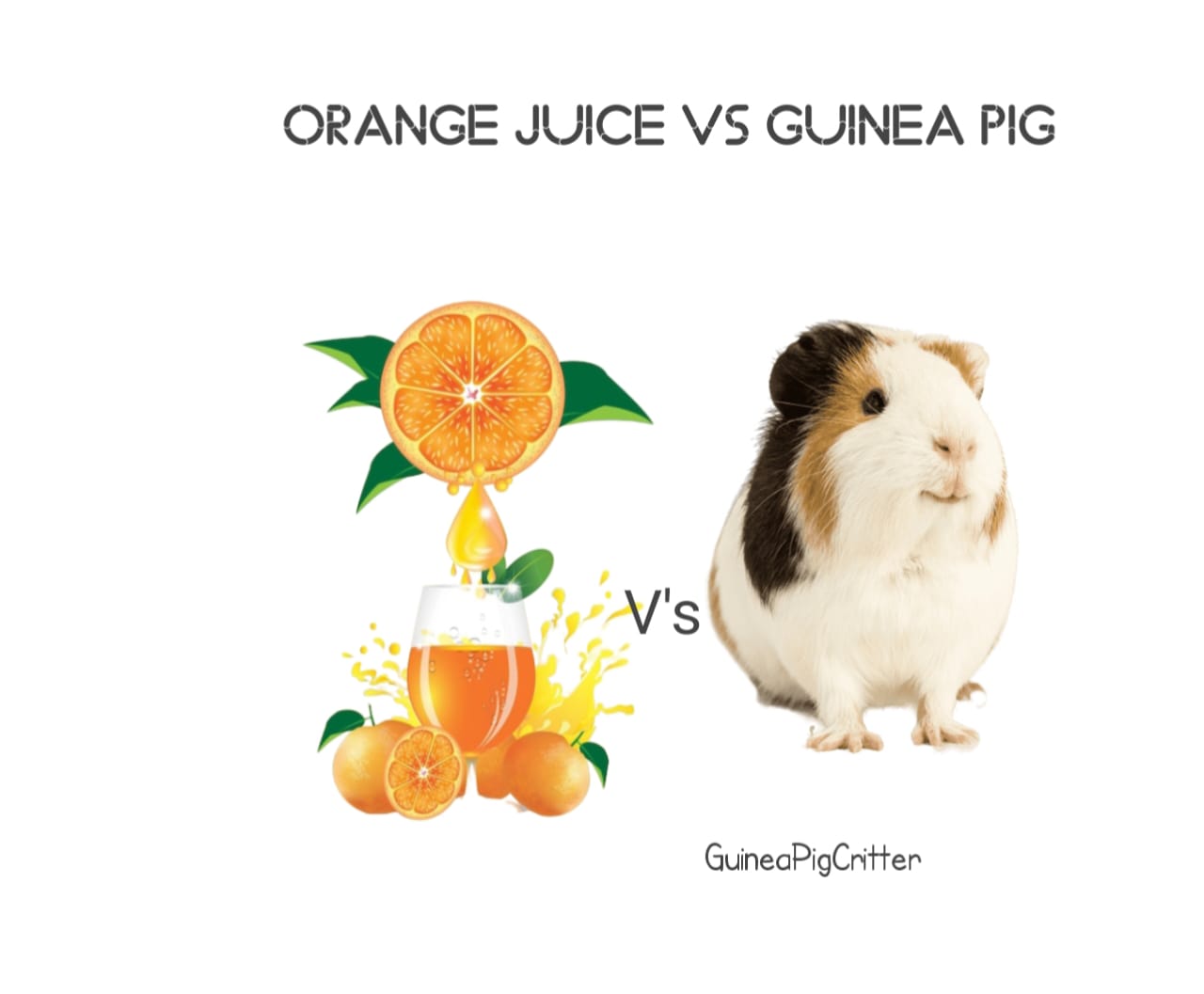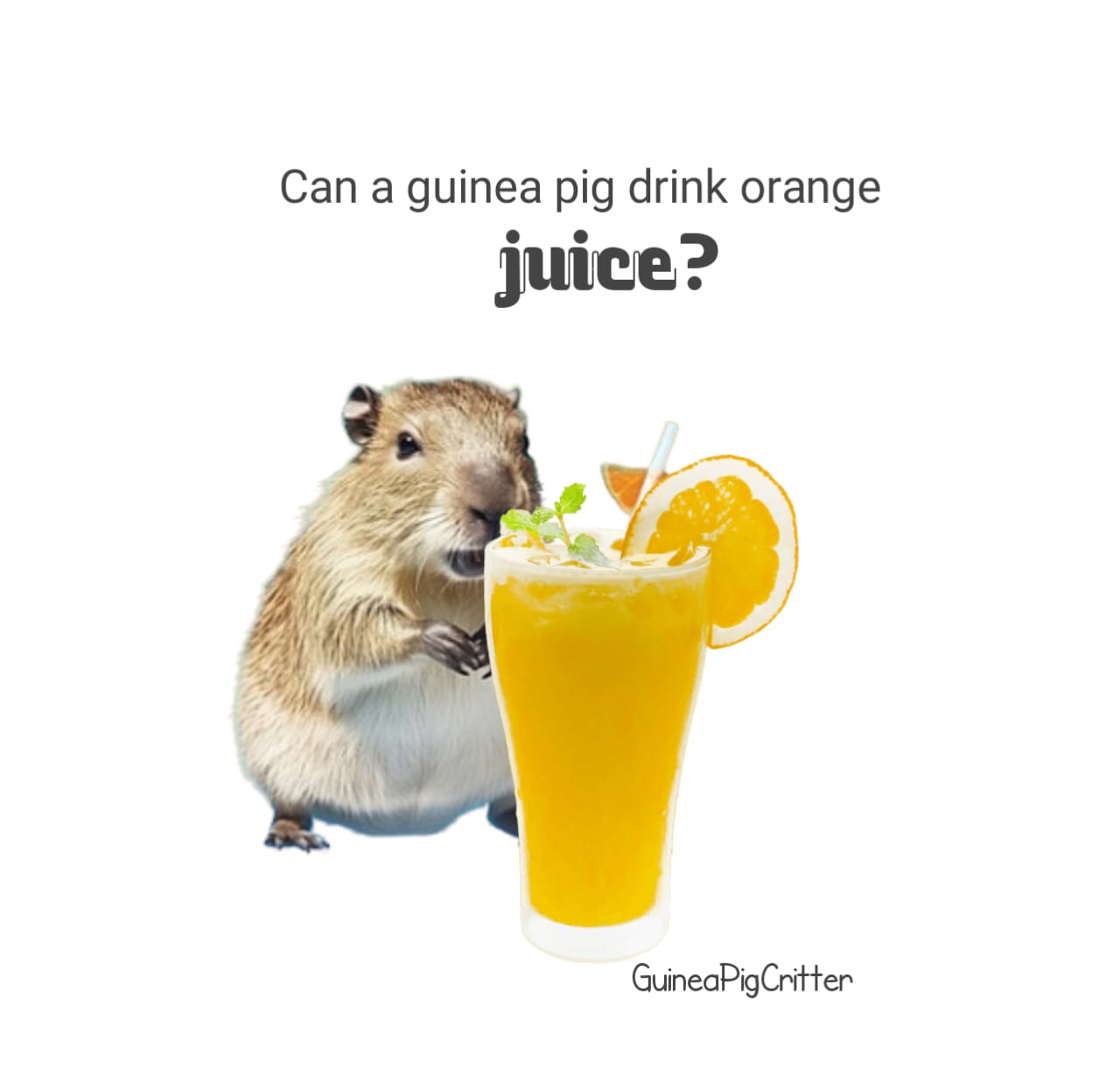Guinea pigs are cute little animals with sensitive guts and special dietary requirements. Due to the nature of their pet, animal caregivers, or individuals preparing to get one, have been curious about various topics: these range from, what guinea pigs eat to what they can’t eat or drink.
In fact, one of the questions frequently asked by many people is, “can guinea pigs drink orange juice or even eat oranges?” Oranges are well-known as a rich source of vitamin c; however, it is necessary to clarify a number of important issues before giving an orange or its juice to a guinea pig.
The purpose of this post is to explain why orange juice is not a safe diet for guinea pigs and what can be offered to guinea pigs instead.
See this post:-can guinea pigs eat plums?
Understanding guinea pig nutrition
Guinea pigs, or cavies for short, are strict herbivores which means they do not eat any food that is not plant based. These little creatures are quite peculiar when it comes to their diet. Here is a quick guide of what they need in general for their health.
Fresh vegetables: vegetables, especially fresh ones, have to be provided to the guinea pigs on a daily basis. As examples of good options, you can take leafy greens like romaine lettuce, cilantro, and parsley. Vegetables that are high in vitamin c such as bell pepper and kale are necessary because guinea pigs also cannot synthesize ascorbic acid just like ourselves.
Water: water must always be provided to your guinea pig. This is the first source of drink that they take and any other is strictly chosen.
So, let’s expand on their specific dietary needs and see where orange juice fits or rather doesn’t fit within all this scenario.
The appeal of orange juice: a nutritional breakdown
For guinea pigs, the appeal of orange juice might sound appealing since oranges have always been known for their high source of vitamin c. Vitamin c is indeed highly crucial for guinea pigs because when not met enough, they can be affected by a certain disease known as scurvy.
Scurvy can cause certain symptoms such as joint pain, an increase in the sense of appetite, or a lowered immune system. So, in that regard, troubling of providing orange juice seems a reasonable option, yes?
Not so fast
Despite orange juice containing vitamin c, it also has some substances that may be harmful to guinea pigs. Below are the constituents usually found in orange juice.
High natural sugar content: how can i imagine only one glass of orange juice. Even though it’s natural, it’s still sugar, and guinea pigs are highly sensitive to it. Even a small glass represents a significant quantity of sugar.
Acidic nature: orange juice is not good for the delicate guinea pigs’ stomachs, as it is acidic.
Inadequate fiber: in a whole fruit, guinea pigs can get everything – as much as they really need. It’s not empty, as when it comes to oranges, but it’s less.
Why is orange juice dangerous for guinea pigs?
Let’s break down the reasons on which pet parents blame orange juice is not so good drink for guinea pigs:
high natural sugar content
If you want to know how much sugar is in an orange juice try 1 cup. Such amount of sugar is far too much for their body to handle, and in that regard it’s 4 teaspoons. Even if it fructose from orange juice, it’s still a common ingredient. In any combination it leads to self-isolation and bulking:
Weight issues: overall even if you are trying a light diet, such as for guinea pigs, nutrition matters a lot. In a case like this, disproportion right to entire body also becomes reasonably high. The disadvantages of such a case are highly likely heart disease and obesity
Diabetes: overabundance of sugar can contribute to diabetes in guinea pigs, similar to that in human beings. This condition is not only hard to control but can also greatly diminish the quality of life of your guinea pig.
Digestive issues: the digestive tract of a guinea pig is made to accept low sugar high fiber content food. Sugar overdose can upset the microorganisms in the intestines which in turn could cause diarrhea, abdominal distension or other gastroenteric disorders.
acidity
The other aspect is the acidity of orange juice which can upset the stomach of many guinea pigs. On their own, guinea pigs graze on greens and grass hay which is low on acid. But when such animals ingest acidic foods or drink, it may result in.
Stomach upset: when the diet contains too much acid, the guinea pig suffers pain and distress. If orange juice or any other mildly acidic substance irritates the stomach then the guinea pig may stop eating, be slothful or show other symptoms of gas or bloating.
Dental problems: open rooted teeth are a characteristic feature in guinea pigs meaning the teeth continue to grow throughout their life. This will greatly lead to the erosion of the teeth enamel caused by strong acids in their food.
chances of stone formation in the kidney and bladder
Orange juice also contains calcium and phosphorus, which lead to the formation of both kidney and bladder stones in guinea pigs. Guinea pigs need calcium but not in large amounts since these same citrus fruits are very high in calcium.
If a stone is not treated, it can cause pain or even death! Just a few of the symptoms of this include blood in the urine, straining to urinate, increased water intake, and even decreased appetite. It is wise to stay away from foods and beverages that can contribute to these painful stones.
Risks that come with orange juice
To cube the specific disadvantages that are associated with providing orange juice to guinea pigs in the following manner:
Diarrhea and dehydration: resulting from the high sugar and low fiber content, short bouts of diarrhea can occur which can rapidly lead to dehydration an extreme case scenario in small creatures such as guinea pigs.
Obesity and related issues: the soda is loaded with sugar and hence can be a cause of obesity as discussed earlier which causes more health problems such as trouble in movement and increased chances of heart diseases.
Dental erosion: orange juice has teeth eroding acids in large amounts which can result in dental erosion which leads to pain, trouble eating and other long standing oral problems.
Kidney and bladder stones: excessive calcium and phosphorus from eating citrus fruits can cause stones in the kidney and bladder, which are again painful and very dangerous if ignored.
Healthy alternatives: what should guinea pigs drink?
After having established the reasons why orange juice is not safe for guinea pigs, let us now discuss the best ways of ensuring that they remain hydrated and healthy.
water
Guinea pigs only require water as their drink and nothing else. A clean supply of fresh water must always be provided to the guinea pig. It is advisable to:
Change the water on a daily basis as it gets stale with time.
Instead of a bowl or a dish, offer a water bottle that has been fitted with a sipper tube in order to avert foulness. Some guinea pigs may prefer drinking from a bowl, but this can be very unhygienic and the bowl of water will get dirtyase.
foods rich in vitamin c
When one is a guinea pig, there is no flesh or blood to eat so it is essential to have foods that boast of this vitamin to the hilt. Some such ways to ensure it are:
Bell peppers: they are very high in vitamin c, so much so that it is a better alternative for animal guinea pig than citrus fruits.
Leafy greens: these include kale, parsley, and romaine lettuce and veggies also provide vitamin c but in addition provide fiber and moisture as well.
Strawberries: people often say that sugar is natural, those people are wrong about strawberries. Strawberries do contain natural sugar but only in small amounts and thus can be used from time to time. Strawberries are better than orange juice in vitamin c since they have only minimal acidity.
What about other fruit juices?
Perhaps you have an inner debate whether there are better fruit juice categories to include in the piggy diet. To be candid, most of them even 100% natural accompanied with agronomic problems just like orange juice:
Too much sugar: fruit juices tend to be too sweet and are highly concentrated sugars which guinea pigs are unable to cope with.
No fiber: juice extracts the fiber which is crucial for utilization in the digestive process.
Acidic content: most fruits are acidic and their juiced products are more so, which may be injurious to the ingestion tract of the guinea pig.
If you are searching areas for maximum hydration for your guinea pig, believe in fresh water and vegetables with high water content such as cucumber, as they also supply vitamins.
Check also this post: can guinea pigs eat spinach?
Conclusion
So then, can guinea pigs drink orange juice? The answer is a clear no. Even though orange juice can be seen as a good treat due to its occurrence of vitamin c, the damage it will cause will be more than the good. The high levels of sugar and acidity, and little fiber may lead to gastrointestinal diseases, obesity, dental problems, kidney stones and so on.
Rather, give your guinea pig a well-rounded diet consisting of nothing but hay and healthy greens, and provide plenty of c with fresh vegetables such as bell peppers and green leafy vegetables. Guinea pigs should always be drinking water as it is a primary drink and anything else is unneeded and at times detrimental.


